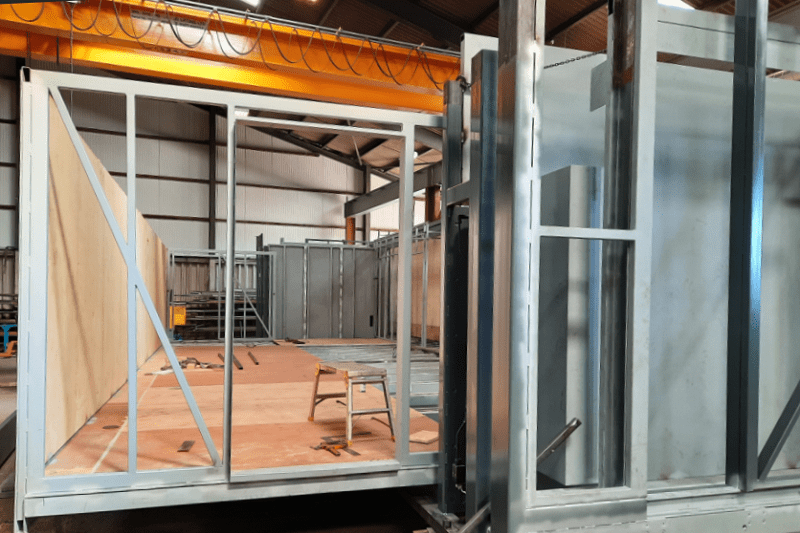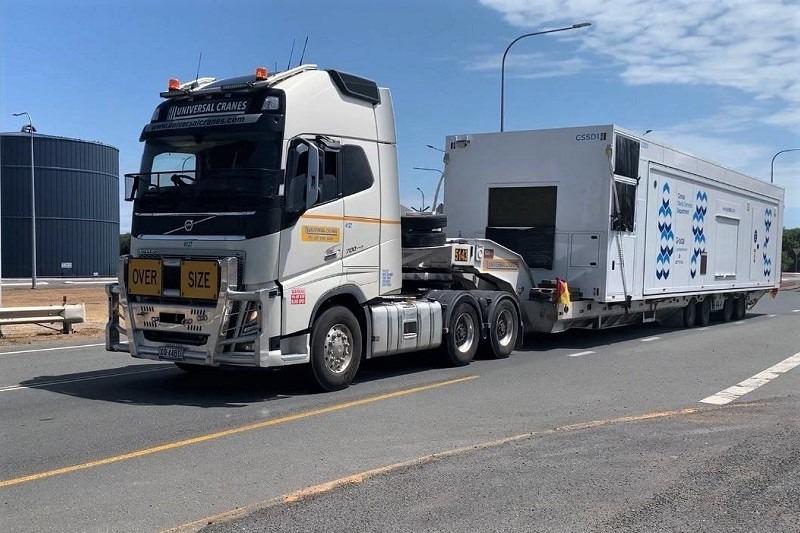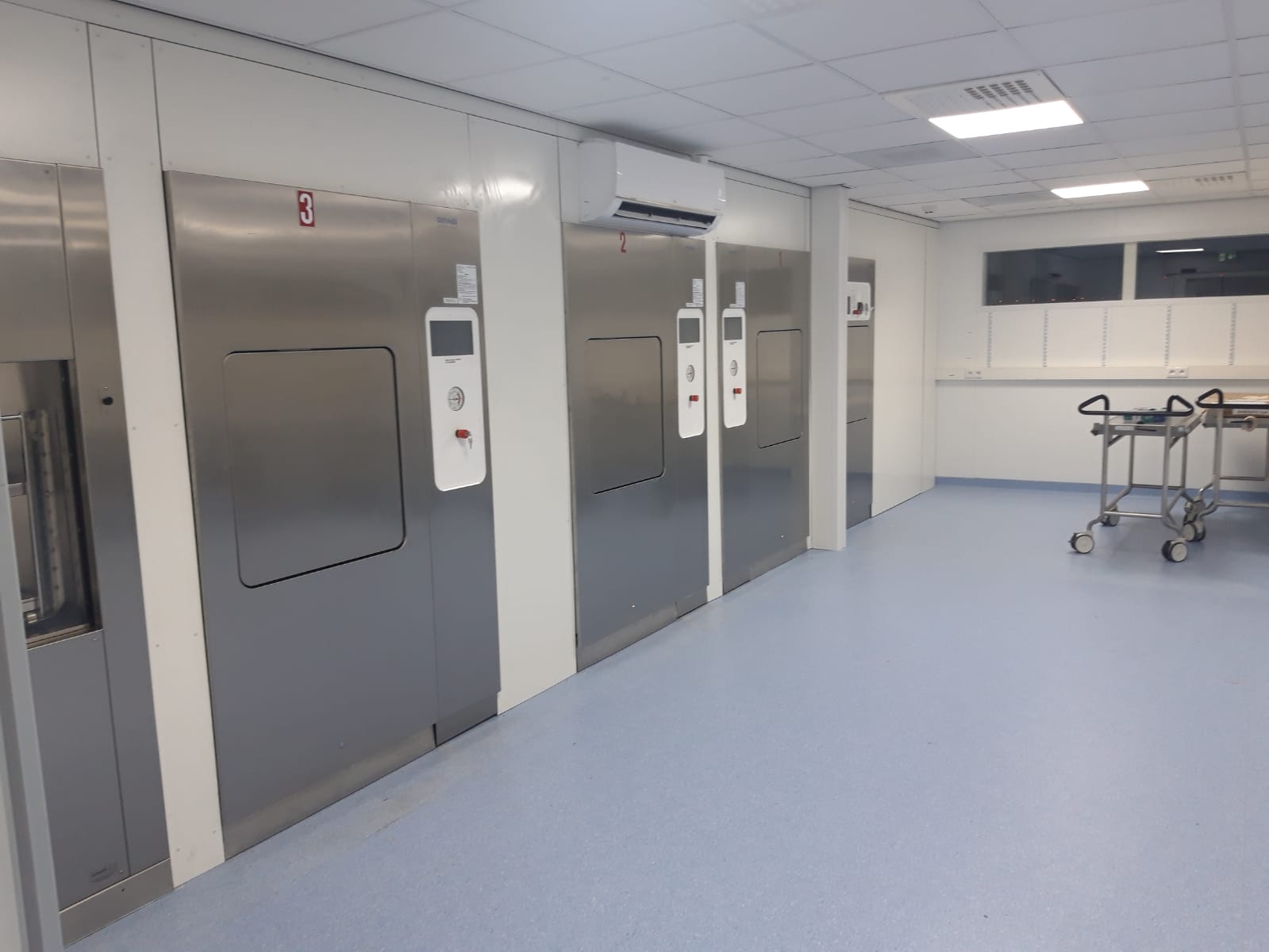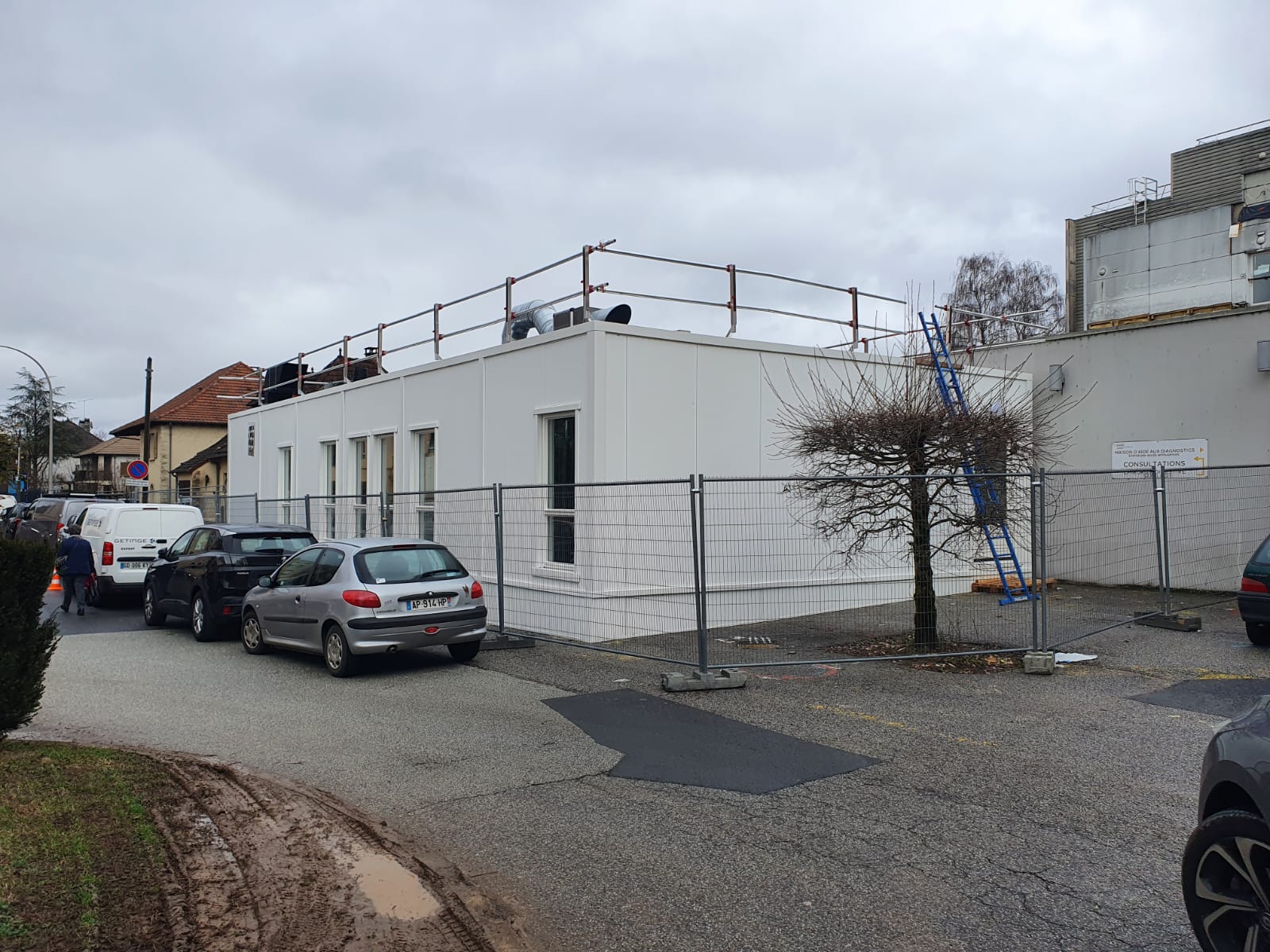Two new mobile laminar flow operating rooms have just come off the production line, meaning additional surgical capacity will soon be available to healthcare providers. But before they can be deployed, the facilities will need to be modified for their intended use and undergo thorough testing. These new operating rooms, and additional rooms that will follow in the coming months, are being produced to help deal with rising waiting lists as Covid-19 pressures continue to cause disruption. With elective surgery suspended or postponed at various times during the pandemic, waiting lists have increased in many countries and hospitals in certain areas now face substantial backlogs.
Mobile operating rooms provide a safe and effective solution for hospitals to deal with rising waiting lists. The new Q-bital facilities have laminar flow and are fully compliant with local standards. They are suitable for most procedure types, including trauma or urgent surgery, cancer surgery and elective procedures with long waiting lists. A couple of years ago, a mobile operating room was even used for open heart surgery at the Alfred Hospital in Melbourne, Australia.
As well as an operating room, new facilities incorporate an anaesthetic room, a 2-bed recovery area, a scrub area, and utility and changing areas, making the solution a capable expansion to any surgical room block. As with all of Q-bital’s mobile healthcare facilities, the units have been designed around efficient patient flows and with the needs of the user in mind.
Advanced mobile healthcare units are much more than just an operating room on wheels or a shipping container with surgical lights. They are sophisticated purpose-built facilities which take a long time to build so they meet the same high standards as permanent healthcare buildings. They come with features such as modern lighting and specialist equipment needed to perform the procedures. In some cases, the equipment in the unit can be more high-tech than those in the main hospital.
Creating mobile healthcare units is a collaborative process. Although set designs are often used as a starting point, the design process involves close collaboration between the manufacturer, the design engineer, Q-bital teams and technical specialists that are consulted on specific areas of the design. The final destination of the facility, the types of procedures it will be used for and the types of patients that will be treated in it are considerations that may affect the design.
Once all aspects of the design are finalised, the facility goes into production. Producing the facilities in a factory environment by a team with specific experience of this type of health facility means it is easy to assure build quality and fundamental adherence to standards. The facilities undergo thorough testing and inspection before leaving the factory.
The operating rooms are designed to be high-performing, safe and compliant with all relevant regulations, but in some cases, modifications are made in the destination country to ensure full compliance with local regulations, standards and protocols, and in some cases, clients’ individual needs.
 Mobile operating rooms have a range of on-board systems, such as HEPA filtered HVAC systems, treated water and integral MGPS systems where required, as well as other built in utilities connections for which standards often differ between countries. In the case of Australia, for example, the rooms are shipped over before the electrical systems, medical gas and water systems are installed, to ensure it meets all the local standards. Fire alarms is something else that tend to be country-specific.
Mobile operating rooms have a range of on-board systems, such as HEPA filtered HVAC systems, treated water and integral MGPS systems where required, as well as other built in utilities connections for which standards often differ between countries. In the case of Australia, for example, the rooms are shipped over before the electrical systems, medical gas and water systems are installed, to ensure it meets all the local standards. Fire alarms is something else that tend to be country-specific.
Q-bital consults with in-country air conditioning, medical gas and water specialists on any proposed changes, and in some countries, it has a specialist local engineering partner that makes the required physical modifications needed.
It makes sense to do the final fit-out locally. Operating rooms are complex facilities, and it is not just about the technical services – everything needs to be right, from the physical connections to the minor details that ensure the facility is comfortable to work in.
Once the facility has been taken to the site, further checks are made. After the installation is complete, prior to the contract starting, a full validation and commissioning programme is carried out. This includes air quality testing, water sampling, electrical testing and validation of any equipment. Staff are also trained in how to use the facility.
Mobile units are also regularly maintained and serviced. Between contracts, they are brought back to the
 service yard for any necessary maintenance and refurbishment work to be done and for checks to be performed.
“The biggest challenge when designing and building a mobile operating room is ensuring it meets all the relevant standards in each country”
says Glen Suttenwood, Technical Projects and Logistics Manager at Q-bital Healthcare Solutions.
“Mobile healthcare facilities may be temporary, but they are built to last - one of our operating rooms, used for major orthopaedic joint surgery, was at the same site for more than 10 years as an integral part of the hospital’s estate. The equipment and services inside can be upgraded, so the life of a mobile operating room is really dictated by how well they are looked after. Q-bital ensures all units are maintained to a high standard at all times”.
service yard for any necessary maintenance and refurbishment work to be done and for checks to be performed.
“The biggest challenge when designing and building a mobile operating room is ensuring it meets all the relevant standards in each country”
says Glen Suttenwood, Technical Projects and Logistics Manager at Q-bital Healthcare Solutions.
“Mobile healthcare facilities may be temporary, but they are built to last - one of our operating rooms, used for major orthopaedic joint surgery, was at the same site for more than 10 years as an integral part of the hospital’s estate. The equipment and services inside can be upgraded, so the life of a mobile operating room is really dictated by how well they are looked after. Q-bital ensures all units are maintained to a high standard at all times”.
Having a mobile room on site can help with safely managing patient flow and allowing both urgent and routine surgery to go ahead during local outbreaks of Covid-19. The new facilities from Q-bital can be combined with modular units to create a completely stand-alone facility or surgery centre capable of admitting, treating and discharging non-Covid patients, and increasing resilience in case of future spikes in demand.
Configured to deliver real surgical laminar flow, they are optimal for procedures with long waiting lists, such as cataract surgery, hip replacements, knee replacements and joint revisions. Alongside providing additional surgical capacity, the facilities also provide replacement capacity during periods of refurbishment.
To date, hundreds of thousands of procedures have been conducted in Q-bital’s flexible mobile healthcare facilities in partnership with healthcare providers across dozens of countries. Get in touch now to find out more about the latest additions to our fleet, or to enquire about availability.



Q-bital Healthcare Solutions
Unit 1144 Regent Court, The Square, Gloucester Business Park, Gloucester, GL3 4AD
